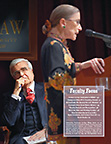Introducing Sarah Woo
Assistant Professor of Law
Printer Friendly VersionIn the fall of 2007, before the real estate collapse made national headlines, Sarah Woo and her husband, Kenneth Wee, were driving from Tucson to the Grand Canyon for their annual hike, when Woo noticed a startling number of abandoned properties and foreclosure signs. Once she returned to Stanford Law School, she examined the legal filings and found that a staggering proportion of residential developers that filed for Chapter 11 bankruptcy ended up in liquidation as compared to the past, and that existing scholarship did not look at the banks’ financial distress to explain, in part, a bank’s preference for liquidation of debtors over Chapter 11 reorganization.
From that inquiry, she developed her doctoral dissertation, “A Blighted Land: An Empirical Study of Residential Developer Bankruptcies in the United States—2007–2008,” a timely examination of the role the banks played in increasing asset liquidations and possibly prolonging the current housing crisis. Woo is currently expanding that work into a book. “Some legal scholars understand the law but don’t necessarily understand how to do economic analysis. She does both,” says Stanford’s Alan Jagolinzer, who sat on Woo’s dissertation committee. “She is among an elite body of researchers working at the intersection of law and economics.”
Woo is also a law and society scholar, mentored by Stanford’s Lawrence Friedman, a founding father of the law and society movement. She joins the faculty in September, and will teach international financial regulation and international insolvency.
Woo’s research interests center primarily on financially distressed companies and the legal and regulatory frameworks, domestic and transnational, that they operate in, such as the Basel II Accord. Her preferred methodology is large-scale empirical analysis, for which she is currently building databases on bankrupt companies, based on sources such as court filings and market data.
Growing up in Singapore, Woo was a self-confessed math and computer science geek in high school. She says: “I was that person in class who preferred to spend most of her free time writing computer codes and working out mathematical proofs.” At her parents’ urging, Woo tried out law at the National University of Singapore. After topping her class in her first year, she stuck with it.
Graduating in 2001 with First Class Honors, Woo went to Baker & McKenzie, where she worked on cross-border financing, bankruptcy, and debt restructuring projects. She left to follow her future husband to Stanford, earning an LL.M. in 2003, then worked as an associate at White & Case in San Francisco, focusing on transactional and bankruptcy work. Some months later, she got a call from Morgan Stanley, where she had interviewed people for her masters dissertation. “The chance to work on the ground with investors and analysts in an area of my research interest, instead of being a mere observer, was very appealing. I decided to take a chance on adventure.”
In 2005, she left Morgan Stanley to join Moody’s KMV in New York and London, consulting for financial institutions. She used her qualitative and quantitative skills to build financial risk assessment models. Realizing that legal expertise in corporate bankruptcy was rarely incorporated into quantitative risk models, “I was inspired to bridge the gap between law and finance by gathering data from legal dockets to inform what was happening on Wall Street,” she says. She returned to Stanford to build the database and complete her doctorate.
Woo sees her move to NYU Law as a strategic advantage. “It is very important to be in a city where I can meet industry players, and to be at a school that is supportive of interdisciplinary empirical research,” she says. “NYU is the place to work on issues relating to financial regulatory reforms.”
—
All of 2010 Faculty Focus


 Multimedia
Multimedia